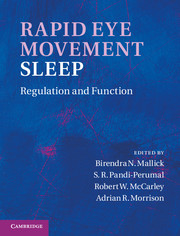Book contents
- Frontmatter
- Contents
- Contributors
- Preface
- Acknowledgments
- Organization
- Section I Historical context
- Section II General biology
- Section III Neuronal regulation
- Section IV Neuroanatomy and neurochemistry
- Section V Functional significance
- 30 Significance of deprivation studies
- 31 Modulation of body core temperature in NREM sleep and REM sleep
- 32 Sleep-related hippocampal activation: implications for spatial memory consolidation
- 33 The role of REM sleep in memory consolidation, enhancement, and integration
- 34 The role of REM sleep in emotional brain processing
- 35 REM-sleep loss, oxidative damage, and apoptosis
- 36 The role of REM sleep in maintaining neuronal excitability and its possible mechanism of action
- 37 Comparison of REM sleep-deprivation methods: role of stress and validity of use
- 38 REM sleep in patients with depression
- 39 Proteins and neuropeptides in REM-sleep regulation and function
- Section VI Disturbance in the REM sleep-generating mechanism
- Index
- Plate section
- References
34 - The role of REM sleep in emotional brain processing
from Section V - Functional significance
Published online by Cambridge University Press: 07 September 2011
- Frontmatter
- Contents
- Contributors
- Preface
- Acknowledgments
- Organization
- Section I Historical context
- Section II General biology
- Section III Neuronal regulation
- Section IV Neuroanatomy and neurochemistry
- Section V Functional significance
- 30 Significance of deprivation studies
- 31 Modulation of body core temperature in NREM sleep and REM sleep
- 32 Sleep-related hippocampal activation: implications for spatial memory consolidation
- 33 The role of REM sleep in memory consolidation, enhancement, and integration
- 34 The role of REM sleep in emotional brain processing
- 35 REM-sleep loss, oxidative damage, and apoptosis
- 36 The role of REM sleep in maintaining neuronal excitability and its possible mechanism of action
- 37 Comparison of REM sleep-deprivation methods: role of stress and validity of use
- 38 REM sleep in patients with depression
- 39 Proteins and neuropeptides in REM-sleep regulation and function
- Section VI Disturbance in the REM sleep-generating mechanism
- Index
- Plate section
- References
Summary
Summary
Cognitive neuroscience continues to build meaningful connections between affective behavior and human brain function. Within the biological sciences, a similar renaissance has taken place, focusing on the role of sleep in various neurocognitive processes and, most recently, the interaction between sleep and emotional regulation. In this chapter, I survey an array of diverse findings across basic and clinical research domains, resulting in a convergent view of sleep-dependent emotional brain processing. Based on the unique neurobiology of sleep, I outline a model describing the overnight modulation of affective neural systems and the (re)processing of recent emotional experiences, both of which appear to redress the appropriate next-day reactivity of limbic and associated autonomic networks. Furthermore, an REM sleep hypothesis of emotional-memory processing is proposed, the implications of which may provide brain-based insights into the association between sleep abnormalities and the initiation and maintenance of mood disturbances.
- Type
- Chapter
- Information
- Rapid Eye Movement SleepRegulation and Function, pp. 339 - 349Publisher: Cambridge University PressPrint publication year: 2011



